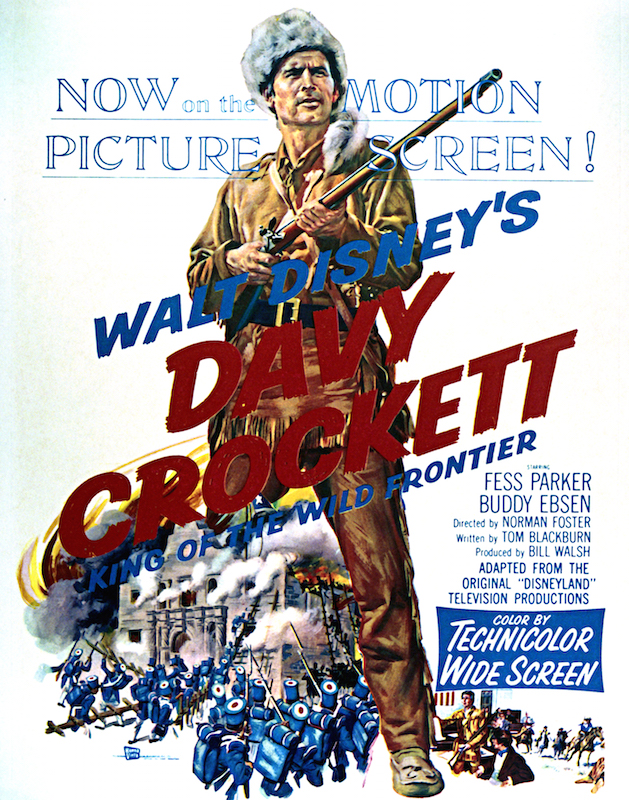
The 19th-century American frontiersman and politician David “Davy” Crockett was born 230 years ago Wednesday, but not on “a mountaintop in Tennessee”—contrary to the first line of “The Ballad of Davy Crockett,” the song made famous by Disney TV series in the mid-1950s.
“He was born on the banks of the Nolichucky River, not too far from the mountains, but it’s a river valley,” says Bob Thompson, author of Born On A Mountaintop: On The Road With Davy Crockett And The Ghosts Of The Wild Frontier.
It’s one of many exaggerations in the tune popularized by Disney’s TV and movie versions of Crockett. Of course the song was made for entertainment purposes, and not meant to be completely factually accurate, but the anniversary is an excuse to talk about a few myths about the legendary man in the tune. While there have been many different recordings, Thompson helps “fact-check” a few of the main themes that can be found in any of them.
Did he kill a bear when he was only three?
This one’s easy: “There’s no evidence that he did, and he did not claim to do so,” Thompson says. “But he grew up to be a very skillful hunter and killed many, many. Bear-hunting was kind of a trademark for him in his political campaigns.”
Did he fight “single-handed” against the Creek Indians?
“He volunteered to fight, but he was a small and unimportant part of the Creek War,” says Thompson. The more interesting note here is the question of Crockett’s legacy in light of modern views about 19th-century treatment of Native Americans. “When he fought, he participated in some things which were quite horrific. There was one ‘battle’ which was essentially a massacre that he participates in and writes about this in his own autobiography,” Thompson adds. “Part of his legend, which is heavily created by Disney’s show, is that he was a defender of Indian rights, and this is true up to a point. He ends up voting on the right side of the issue in Congress — against Andrew Jackson’s Indian Removal bill that passed and resulted in the Trail of Tears.”
Get your history fix in one place: sign up for the weekly TIME History newsletter
So he did “serve a spell” in Congress, “fixin’ up the Government and laws” and taking over Washington?
“He did go to Congress and served three terms. He was a well-known figure because he came to symbolize the frontier,” Thomspon says, “but he didn’t get anything done.”
His main goal as a lawmaker was a complicated one, involving sorting out a fight between his constituents—many of whom were essentially squatters, poor farmer-pioneers who worked land they didn’t own—and speculators who wanted to profit from the land on which they lived. “If you watched the films,” Thompson says, “you’d think Indian rights was the issue he most cared about, but it was small issue compared to land rights of his constituents.”
Did they “need” him at the Alamo?
“He was a volunteer. The song implies and the movie implies that many believe he went to Texas to fight in the Texas Revolution, but that’s not the case. He went because all his life he kept moving West in search of better land and better opportunities as so many people did. Other than his fame, he was very characteristic of those people in that he didn’t have any money. He had lost re-election in Congress, so he went back to west Tennessee and thought, ‘Let me go where grass is greener.’ When he got to Texas, he enlisted to fight and ended up in the Alamo and that’s how he died [on March 6, 1836],” Thompson says. “Probably Alamo is the reason we remember him today because it’s a hugely important event both in the history and the mythology of Texas—and Crockett was, at the time, the most famous person there.”
More Must-Reads From TIME
- The 100 Most Influential People of 2024
- The Revolution of Yulia Navalnaya
- 6 Compliments That Land Every Time
- What's the Deal With the Bitcoin Halving?
- If You're Dating Right Now , You're Brave: Column
- The AI That Could Heal a Divided Internet
- Fallout Is a Brilliant Model for the Future of Video Game Adaptations
- Want Weekly Recs on What to Watch, Read, and More? Sign Up for Worth Your Time
Write to Olivia B. Waxman at olivia.waxman@time.com